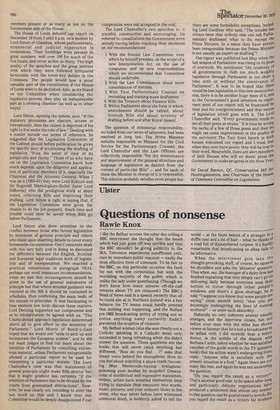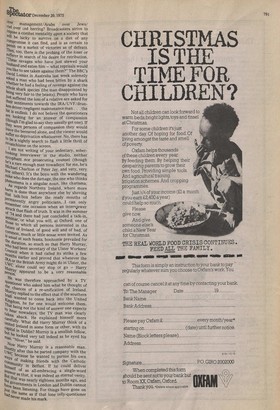Ulster
Questions of nonsense
Rawle Knox
I like the Belfast woman the other day telling a BBC interviewer she thought that the bomb which had just gone off was terrible and that the BBC shouldn't be giving publicity to the IRA. Television experiences insufficient criticism by immediate public reaction — easily the most effective form of comment. To be fair to the BBC, on this particular occasion the fault lay not with the corporation but with the mumbling majority of the public which is unlike the lady under questioning. (Though we don't know how many adverse off-the-cuff remarks about TV are censored.) The BBC's Head of News said in a speech recently that all he could aim at in Northern Ireland was a fair balance; his TV teams could hardly pretend that nothing was happening, and the Belfast pre-1969 broadcasting policy of trying not to notice anything nasty certainly hadn't prevented the eruption of violence.
My Belfast woman (alas she was clearly not a Catholic speaking in a Catholic area) only succeeded in being refreshing when she didn't answer the question. Those questions are the hooks that will never catch anything but driftweed. "How do you feel. . .?" asks that dreary voice behind the microphone. How do you feel -about watching a plane crash/becoming Miss Merseyside/ having sextuplets/ poisoning your mother by mistake? Generations of intellectual and expressive statesmen, writers, artists have wrestled themselves limp trying to translate their emotions into words, music, pictures; and your ordinary bloke in the street, who may never before have witnessed unnatural death, is suddenly asked to tell the world — at the blunt behest of a stranger in a duffle coat and a lot of hair — what he thinks of a road full of dismembered corpses. It's hardlY remarkable that broadcasting so often fails to be informative.
When the interviewer gets into the thought-provoking stuff, of course, he squares his shoulders and asks the 'abrasive' question. Thus when, say, the manager of a dairy firm has finished explaining that they simply can't go °,1.1 delivering daily because everyone uses their bottles to throw through other people.a windows, and there's a glass shortage, he is told: "I suppose you know that some people are saying" (note smooth intro) "that you are knowingly endangering the lives of nursing mothers?" — or some such absurdity. Naturally no very coherent answer usuallY emerges, and the interview closes, but not before your man with the mike has shown viewer or listener that he's not a broadcaster W be trifled with. I did recently hear a senior doctor, in the middle of the dispute with, Barbara Castle, asked whether he was satisfied (another of the guide words in the TV question book) that his action wasn't endangering
reply: "Anyone who is satisfield with the present situation is a fool." Again there are not many like him, and again he was not answertng the question.
"Do you regard the result as a victory?" That's another goodone: to be asked after long and particularly delicate negotiations have produced a settlement that almost any answer to this question can be guaranteed to wreck. P° you regard the result as a victory for workers aver management/Arabs over Jews/ Cud over ied herring? Broadcasters strive to linPose a combat mentality upon a society that Will be lucky to survive on a diet of any eclnPromise it can find, and is as certain to Perish on a surfeit of victories as of defeats. Then, too, there is the probing of the loser or sufferer in search of his desire for retribution. "These savages who have just stewed your husband and eaten him — what reprisals would You like to see taken against them?" The BBC's r)avid Lomax in Australia last week solemnly asked a man who had been bitten by a shark Whether he had a feeling of revenge against the being shark species (the man disappointed by 'eing very fair to the beasts). People who have just suffered the loss of a relative are asked for their sentiments towards the IRA/UVF /drunken driver/negligent maintenance man. . . the list is endlegs. I do not believe the questioners e looking for an answer of compassion (though I'm glad to say they usually get one). If they were persons of compassion they would leave the bereaved alone, and the viewer would suffer no deprivation whatsoever. No, there has to be a nightly search to flash a little thrill of revanchisme on the screen.
am riot writing of your sedentary, sober°°king interviewer in the studio, neither YcoPhant nor prosecuting counsel (though l
a rare enough man nowadays; for me, he's
few Charlton or Peter Jay, and very, very rew others). It's the boyo with the wandering Phenomena who does the damage, the one who thinks Puenomena is a singular noun, like charisma. h AS regards Northern Ireland, where more :rrn is done than anywhere else by shoving :`at talk-box before the ready mouths of 'rrnanently angry politicians, I can only r erneibber one occasion when an interviiewer struck that flash of truth. It was in the summer of '74 and there had just concluded a talk-in, t,serninar, or what you will, at Oxford; one of :u:'se to which all persons interested in the cniture of Ireland, of good will and of bad, of istutanon, much or little sense were invited. As the at such feasts, bonhomie prevailed for t ,.."re duration, so much so that Harry Murray, ',",no had been secretary of the Ulster Workers' .."441ricil when it had called its strike a few in,..briths earlier and proved that whatever the utA,.. or the British Army might do in Ulster, the
WC Murray alone could say stop or go — Harry appeared to be a very reasonable t'rrsoh.
Be was therefore approached by a TV quest'
th Inner who asked him what he thought of e chances of a re-unification of Ireland. m`" frtirraY replied to the effect that if the southern , suo wanted to come back into the United Ti:Igclorn, he for one would welcome them. hat being not the kind of answer one expects t'a, Rear nowadays, the TV man was clearly eLcen aback. He explained himself more IT,..efullY. What did Harry Murray think of a :led Ireland in some form or other, with its h“Pital in Dublin? Murray is a smallish fellow, t he looked very tall indeed as he eyed his mu ah. "Niver," he said. Now Ham, Murray is a reasonable man. ir,;;IllY after this he parted company with the vv.C because he wanted to pursue his own c Ys of making friends with the Catholic o utrnunity in Belfast. If he could deliver anths‘, elf of as all-embracing a single-word au't's'er as that, it was indeed an eternal verity. th that Was nearly eighteen months ago, and e havg°vernments in London and Dublin cannot Iethbeen listening. For things have gone on ttst had e same as if that lone telly-questioner never made his mark.



































 Previous page
Previous page